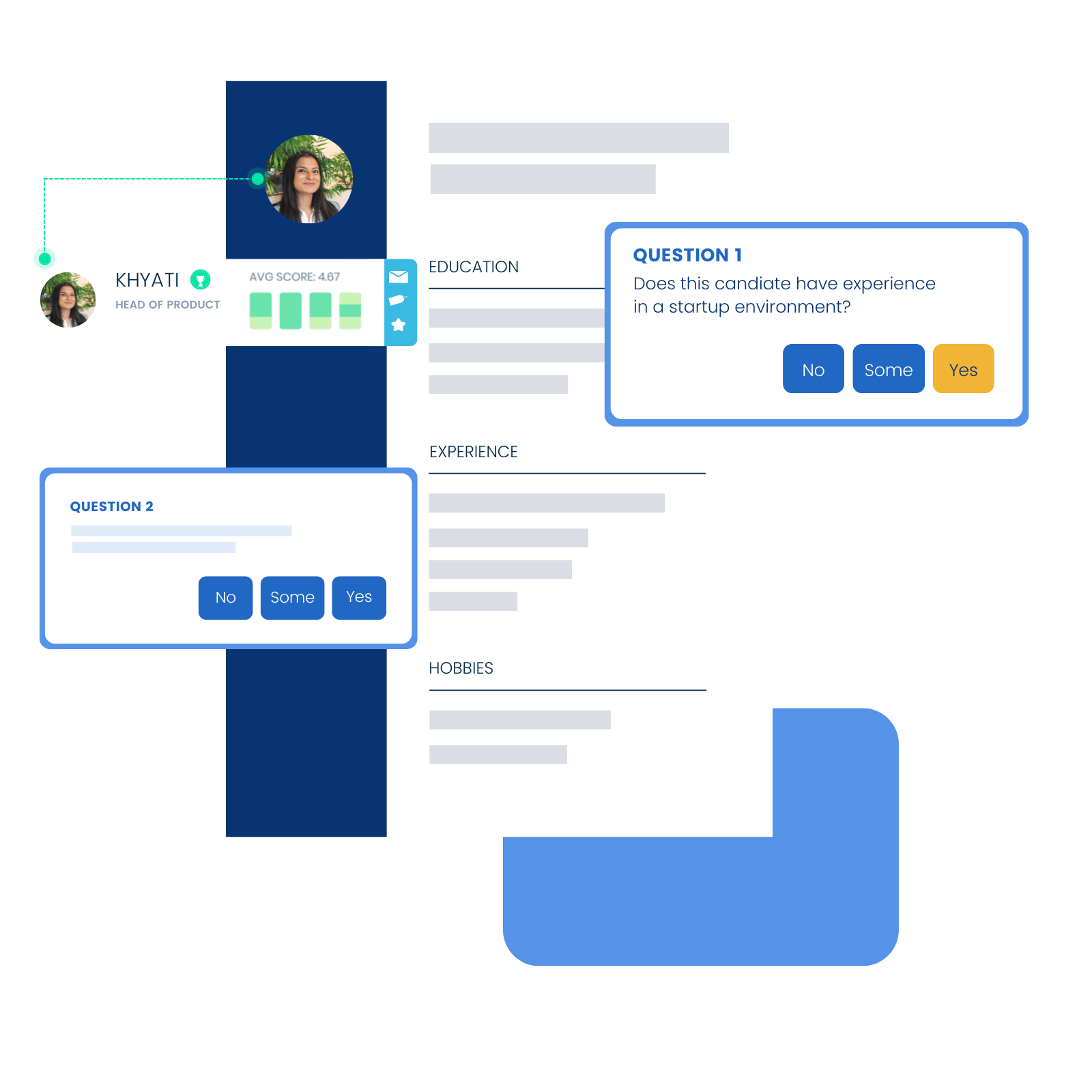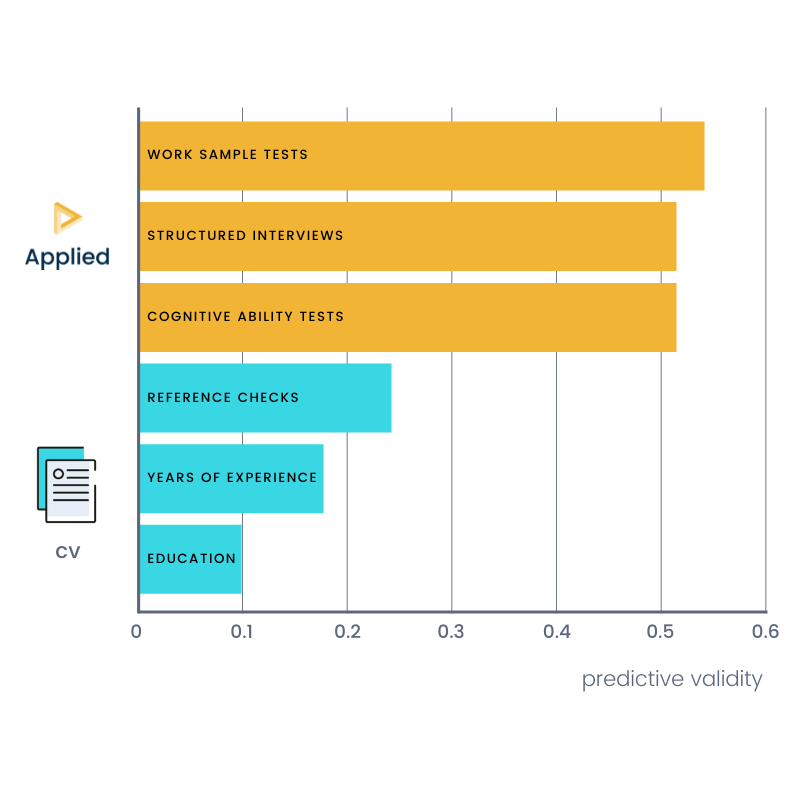
What’s wrong with traditional CV screening practices?
FACT: Humans are prone to unconscious bias.
It doesn’t matter how pure your intentions or well-trained you believe your ‘recruiter instincts’ to be…
If you’re human, you’re subject to biases, whether you’re aware of this or not.
Bias, in itself, isn’t necessarily a bad thing. We use mental shortcuts and associations to make quick, subconscious decisions in our everyday lives - a bit like being on autopilot.
However, problems begin to arise when we look at people-based decisions.
Our tendency to gravitate toward the familiar, draw instant conclusions and then look to confirm our assumptions means that those from underrepresented backgrounds get disproportionately overlooked by a typical CV screening process.

This is why the average CV review takes just 7.4 seconds.
We tend to make snap judgements about candidates based on anything that ‘jumps out’ at us - whether it be a degree from a top university or experience at a big-name organisation.
Whilst this CV screening strategy is generally accepted as the norm - 100+ years of research tells us that this just isn’t the most accurate means of spotting genuine talent.
Not only are education and experience weaker predictors of future job performance than you’d think, but they’re also heavily influenced by socioeconomic factors.
How to reliably predict job performance without giving up CVs completely
Here at Applied, we believe that although they’re far from the perfect measure of job success, sometimes CVs are necessary…
But this doesn’t mean we can’t use them in a more ethical and effective way.
There are a few proven, cost-free tweaks you can make to reduce biases and ensure your CV screening process is a more accurate predictor of who will perform best on the job.
The practices below can either be used independently or (for the most predictive results) in combination with one another.
1. Structure your CV screening process
One of the most critical issues with traditional CV screening is that the process is largely unstructured.
With no set criteria or game plan, hirers will wait for something to catch their attention.
To get more out of your CV reviewing, try giving yourself a list of questions to score CVs against.
- Does this person's experience show the skills you're looking for?
- Have they been promoted in past roles?
- Have they achieved measurable results in their previous roles?
- Does this person have experience in a similar work environment?
Although not a perfect science, this will make the process as objective and structured as possible, with data to back up your decision-making.
Rather than letting instinct dictate who gets shortlisted, structured CV screening will allow you to focus on factors that are actually predictive of future job performance.
For each of your questions, try scoring candidates on a scale of yes - somewhat - no.
This will give you enough data to make more informed decisions.
The Applied Platform now includes our CV Scoring Tool. Score candidates using our Focus Questions - specifically designed to make CV screening more ethical, predictable and efficient.

2. Anonymise candidates to reduce bias
Since we know things like names, photos and dates of birth can all trigger unconscious biases, the best way to reduce bias is to simply remove this identifying information from CVs.
In one of the earliest experiments, orchestras were able to double the number of women making it through auditions just by doing them from behind a curtain.
Here’s the key information that should be anonymised:
- Name
- Photo
- Date of birth
- Address
- Hobbies
3. Use predictive assessments alongside CVs
Perhaps the most fundamental flaw of CVs is that they rely on education and experience to make assumptions about someone's ability.
Not only are these just proxies for the skills we’re actually looking for, but they’re also poor predictors of job performance.
If we look at the research - we can see that education and experience (the core components of a CV) don’t tell us much about how someone will perform in the role.

The most predictive form of assessment is called a work sample test.
Work samples simulate parts of a job by asking candidates to either perform or explain their approach to them.
Instead of using proxies like education and experience to make semi-educated guesses, work samples get candidates to essential to perform small chunks of the job itself.

Work samples are pretty straightforward to create: think of a realistic scenario that candidates would encounter should they get the job, and ask candidates how they would react should this scenario occur.
Your work samples can be simple everyday tasks or more complex situations - we’d recommend using a mix of both to create 3-5 questions.
Need help getting started? Grab our Work Sample Cheatsheet
4. Use multiple reviewers for more accurate judgments
Research shows that two heads really are better than one… although three is ideal.
Since CV screening is usually carried out by a single person, shortlists can end up reflecting that individual’s preferences and biases.
‘Crowd Wisdom’ is the basic principle that collective judgment is more accurate than that of an individual.
When it comes to screening, having three reviewers (the optimal number before returns begin to diminish) independently judge candidates’ CVs will give you more predictive scores than having just one reviewer.
Not only are collective scores more accurate, but they’re also less biased.
When final scores are calculated, any individual’s biases will be averaged out.
Ready for the next step? Here’s how the Applied Platform works
We built Applied to make hiring as ethical and predictive as it should be - from CV screening through to interviews and job descriptions.
Every step of our process is specifically designed using behavioural science to minimise bias and predict the very best candidates.
Whether you’re looking to upgrade your CV screening or replace it entirely - we’ll give you all the tools you need to data and bias-proof your process.
- Automate anonymisation
- Structure your CV reviewing
- Use our proven, predictive assessments
- Assign and track your reviewers
- Automate personalised candidate feedback

Applied is the essential platform for fairer hiring. Purpose-built to make hiring ethical and predictive, our platform uses anonymised applications and skills-based assessments to improve diversity and identify the best talent.
Start transforming your hiring now: book in a demo or browse our ready-to-use, science-backed talent assessments.


.png)

.png)

